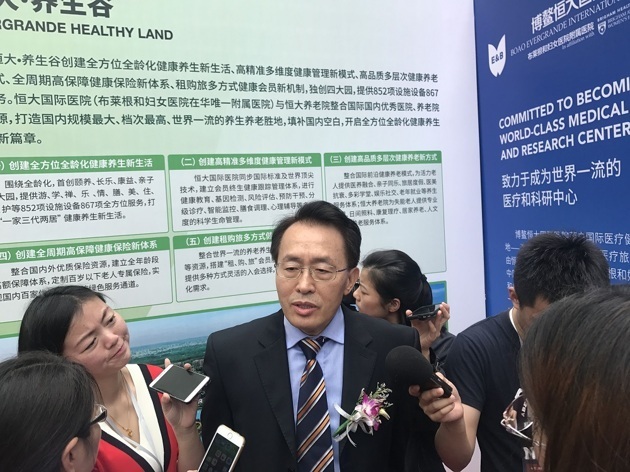
Jiang Wenqi, deputy general manager of Boao Evergrande International Hospital(Photo/NBD)
Mar. 1 (NBD) -- Boao Evergrande International Hospital opened on Wednesday, which was jointly established by China's healthcare company Evergrande Health Industry Group and Brigham and Women's Hospital, an affiliated hospital of Harvard University, specializing in the cancer diagnosis and treatment.
According to the latest data from World Health Organization, 8.8 million people died of cancer every year and the number of cancer cases is forecasted to reach 24 million in 2035. In 2015, China's new cancer cases numbered 4.29 million, accounting for 20 percent of the worlds' total cases, with 2.81 million deaths.
The morbidity and mortality of cancer in China are climbing in recent years. A report released by the R&D-based Pharmaceutical Association Committee in February indicated that in China, about 10,000 people are diagnosed with cancer every day.
As China's healthcare input is increasing recently, the expenditure of this field amounted to 70 billion U.S. dollars in 2016, 6.2 percent of GDP compared to 6 percent in a year earlier.
However, the country's estimated five-year survival rate of cancer in 2015 was about 36.9 percent, far less than USA's 70 percent in 2012, Cai Qiang, founder of the China's biggest foreign medical care institution, told NBD.
The tumor screening and diagnosis industry in China is still at its early stage, only capturing about 5 percent of the tumor medical service market, with a market size of 16 billion yuan (2.5 billion U.S. dollars). The major ways of tumor screening are almost the same in China and USA, which include endoscopic examination, blood examination, imaging examination, but the penetration of the screening in China is much lower than that in USA.
USA has adopted multidisciplinary approach in the cancer treatment which is supported by the whole huge healthcare system, Cai noted.
The gap between the cancer treatment in China and in USA is believed to be caused by several reasons, the limited clinical available new drugs and the relatively backward diagnosis and treatment technology, pathology diagnosis as well as equipment.
Jiang Wenqi, deputy general manager of Boao Evergrande International Hospital said to NBD that the new hospital can fill such gap because it will play an important role in introducing foreign innovative drugs, leveraging benefits from government's policy and convenience brought by the drug bonded warehouse.
The medical institutions are favored by capitals in recent years. In 2015, the medical practice and medical research group Mayo Clinic and the equity investment firm Hillhouse Capital Group jointly established the Huimei Healthcare. The American private equity group TPG and China's conglomerate Fosun jointly acquired medical equipment provider Chindex Medical in 2014. But the number of the high-end hospitals which focus on cancer control and prevention is still small. The public hospitals undertake more than 80 percent of the tumor treatment in China.
Professor Shen Lin, deputy director of Beijing Cancer Hospital, pointed out that currently China's first task in the cancer control and prevention field is to reduce the burden of cancer patients, cure patients or largely extend the survival period and improve the quality of their life by providing cancer comprehensive intervention, screening as well as early diagnosis and treatment.
Email: zhanglingxiao@nbd.com.cn


 川公网安备 51019002001991号
川公网安备 51019002001991号





